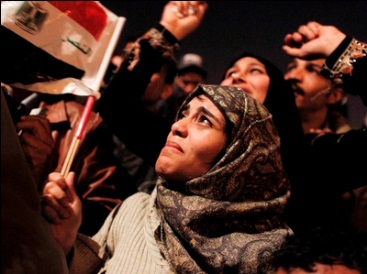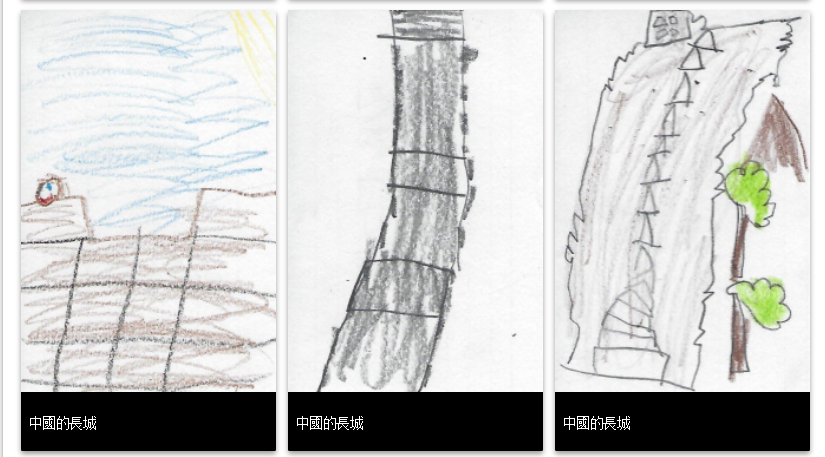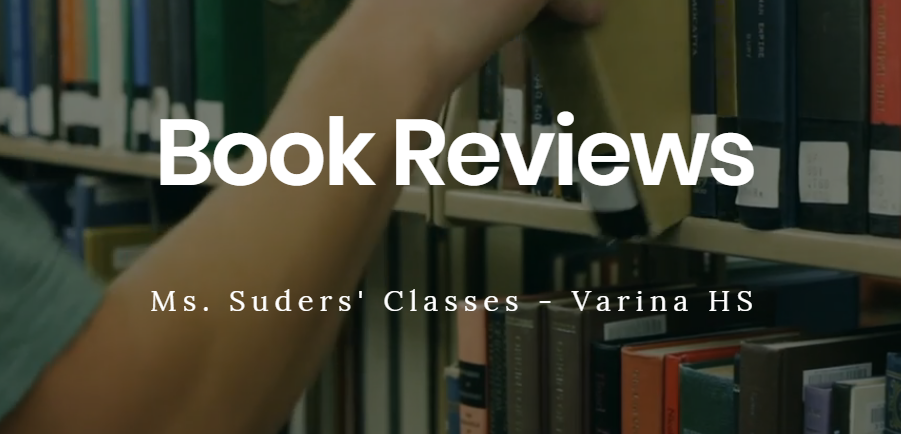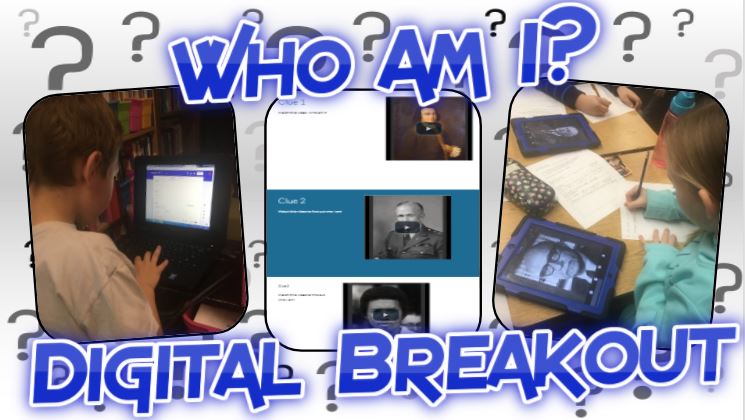Submitted by: Andrea Sward, Julia Fuller, and Kim Morrison
School: J.R. Tucker High School
Summary
In our study of Unit 3, we examined the development of reason and revolutions. We discussed the importance of balance for both the individual and society, as well as the role of leaders (or demagogues, depending on your point of view) in bringing about change. We analyzed both the positive and negative effects of revolutions.
We are now living in a “revolutionary moment” as we watch democratic ideology and popular emotion collide with authoritarian regimes in Southwest Asia. To a greater degree than ever before, these revolutions have been organized and disseminated through the media: the internet, social networks and blogs, and cell phones. Although democratic revolutions are not new, modern media have caused them to proliferate like wildfire throughout the region and beyond (even China saw a sudden wave of protest, inspired by events in Egypt). Distant allies have been forced to respond quickly and rethink their relationships with authoritarian regimes, based on quick assessments of potential outcomes. What unfolded in France over years is taking place today within weeks and months, as information proliferates with the click of a mouse or the touch of a keypad.
One of the significant problems we face in our modern information age is how to sort out and evaluate the available information, how to identify misinformation and disinformation, and how to develop a balanced viewpoint. The speed with which we are presented with information can easily outpace our ability to analyze it and to think through solutions and predict consequences. Misinformation spreads as quickly as fact and has the ability to mobilize individuals who don’t understand the fallacies. Even factual information can be misleading if it is presented from only one point of view. As caring, knowledgeable, open-minded and principled inquirers and thinkers, we face the challenges of educating ourselves, of using the information available with discretion, and of sharing our knowledge with others to achieve a balanced view of events and their implications.
This assignment has two basic components: (1) a 2-3-page research paper on one of the Southwest Asian regimes experiencing confrontation that you will complete individually; and (2) a collaborative class effort to create and maintain a weblog that will supply accurate information to the public, and will enable you to refine and rethink your ideas as you collaborate with your classmates and as events continue to unfold. Your research paper will demonstrate your balanced understanding of relevant history and issues, and will give you an opportunity to incorporate into current events your understanding of the revolutions we studied in Unit 3. Both parts of the assignment will require you to evaluate sources of information. Maintaining the weblog will require you to learn collaboratively through the use of electronic media, to evaluate multiple perspectives, and to disseminate valuable information.
This assignment is being presented as an interdisciplinary activity. You will be evaluated by Mrs. Fuller on items I, III, IV, and V on the assignment; by Mrs. Sward on items II and VI; and by Mrs. Morrison for choice of sources and resources for both the research paper and the blog.
TIPC Ratings
Research and Information Fluency:
TARGET – One of the significant problems we face in our modern information age is how to sort out and evaluate the available information, how to identify misinformation and disinformation, and how to develop a balanced viewpoint. The speed with which we are presented with information can easily outpace our ability to analyze it and to think through solutions and predict consequences. Misinformation spreads as quickly as fact and has the ability to mobilize individuals who don’t understand the fallacies. Even factual information can be misleading if it is presented from only one point of view.
This assignment includes a 2-3-page research paper on one of the Southwest Asian regimes experiencing confrontation and a weblog that will supply accurate information to the public. The blog will enable the student to refine and rethink their ideas as they collaborate with their classmates and as events continue to unfold. Both parts of the assignment will require students to evaluate sources of information. Maintaining the weblog will require them to learn collaboratively through the use of electronic media, to evaluate multiple perspectives, and to disseminate valuable information. This project requires students to determine their own Focus Question, Area of Interaction, and Plan of Action. While researching, they may use news articles, blogs, broadcasts, and must cite all sources and verify that they are relevant and credible. Sources MUST include international publications in translation to maintain a balanced point of view.
Additionally, students are to analyze their research and make conclusions supported by evidence. They are to explain WHY they think the current political situation developed, based on the findings they described or draw conclusions in broad terms about the problems yet to be faced or overcome. In their conclusion, they are also to reflect on their project, what did they learn, how did the research process go, what they would like to learn more about, etc.
All research is conducted using the Big 6 Research Model and documented in proper MLA format. Website sources are evaluated using the Website Evaluation Checklist for authority, reliability, and currency. They are to utilize at least 3 sources in the research paper including at least one international publication with translation and one database article. They are also to include pictures, charts, graphs, and supplementary notes.
Students will publicize the blog at home and at school so that comments and questions are posted to the blog from the general public. The blog will be set up at the start of the project so that they can collaborate and discuss ideas as they proceed with research. Each student will have access to the blog as an author, and will post research and respond to questions and comments from teachers and other users. They may also respond with links to additional resources.
Communication and Collaboration:
TARGET – We are now living in a “revolutionary moment” as we watch democratic ideology and popular emotion collide with authoritarian regimes in Southwest Asia. To a greater degree than ever before, these revolutions have been organized and disseminated through the media: the internet, social networks and blogs, and cell phones. Although democratic revolutions are not new, modern media have caused them to proliferate like wildfire throughout the region and beyond (even China saw a sudden wave of protest, inspired by events in Egypt). Distant allies have been forced to respond quickly and rethink their relationships with authoritarian regimes, based on quick assessments of potential outcomes. What unfolded in France over years is taking place today within weeks and months, as information proliferates with the click of a mouse or the touch of a keypad.
This assignment included a collaborative class effort to create and maintain a weblog that will supply accurate information to the public, and will enable students to refine and rethink their ideas as they collaborate with their classmates and as events continue to unfold. Maintaining the weblog will require students to learn collaboratively through the use of electronic media, to evaluate multiple perspectives, and to disseminate valuable information.
Blog – http://blogs.henrico.k12.va.us/avsward/
This activity will be worked on collaboratively in class, as well as from home. Students will publicize the blog at home and at school so that comments and questions are posted to the blog from the general public. The blog will be set up at the start of the project so that they can collaborate and discuss ideas as they proceed with research. Students researching the same country will share responsibility for questions and posts regarding that country and will develop a plan for allocating responsibility for comments and postings that are not country specific. Students will work together to create a plan for allocating responsibilities fairly. Each group will be responsible for questions posted about their country of research.
Students will reflect in class discussion about what they learned about communication and information in the digital age and the changes in the political landscape that have resulted from the communications revolution. They will also reflect on their roles as communicators and collaborators and identify areas they would like to learn more about.
Critical Thinking and Problem Solving:
TARGET – As caring, knowledgeable, open-minded and principled inquirers and thinkers, students face the challenges of educating themselves, of using the information available with discretion, and of sharing their knowledge with others to achieve a balanced view of events and their implications.
This project requires students to determine their own Focus Question, Area of Interaction and reason (AOI’s include – Environments, Heath & Social Education, Human Ingenuity, Community & Service, and Approaches to Learning), and Plan of Action outlining the steps they will take to complete their research. Also, they must include at least one international publication in translation to maintain a balanced point of view.
Additionally, students are to analyze their research and make conclusions supported by evidence. They are to explain WHY they think the current political situation developed, based on the findings they described or draw conclusions in broad terms about the problems yet to be faced or overcome. Students focus on the impact of modern digital media on all aspects of revolution in order to answer the essential question. They are using higher level thinking skills as they are required to use terminology from the course content to express their ideas and relate today’s revolutions to what they already know about historical patterns of revolution as discussed in class.
In their conclusion, students are to reflect on their project, what did they learn in terms of their AOI, did their outlook/attitude change in any way, what they would like to find out more about because their project has made them interested, etc. They will also reflect in class discussion and through the teacher’s blog on their own and each other’s ideas from the research paper and experiences from their own blogs.
Creativity and Innovation:
APPROACHING – This assignment is being presented as an interdisciplinary activity between Humanities, English, and Library classes. Students previously examined the development of reason and revolutions. They discussed the importance of balance for both the individual and society, as well as the role of leaders (or demagogues, depending on their point of view) in bringing about change. They analyzed both the positive and negative effects of revolutions.
Then students had to examine a new situation through the lens of their Chosen Area Of Interaction and reason (AOI’s include – Environments, Heath & Social Education, Human Ingenuity, Community & Service, and Approaches to Learning), thus synthesizing their existing and self-generated knowledge. They made new conclusions, which MUST be supported by evidence. They are to explain WHY they think the current political situation developed, based on the findings they described or draw conclusions in broad terms about the problems yet to be faced or overcome. They are using higher level thinking skills as they are required to use terminology from the course content to express their ideas and relate today’s revolutions to what they already know about historical patterns of revolution as discussed in class.
In their report, students are to include pictures, charts, graphs, and supplementary notes. Additionally, they will be maintaining a weblog that will supply accurate information to the public, and will enable them to refine and rethink their ideas as they collaborate with their classmates and as events continue to unfold. Students will reflect on their project and reflect in class discussion about what they learned about communication and information in the digital age and the changes in the political landscape that have resulted from the communications revolution.
Download Files
- Lesson Plan
- Pathfinder Big6 Research Model
- Student Artifact
- Link to Student Blog







